Home Tags Posts tagged with "Viktor Yanukovych"
Viktor Yanukovych
Opposition leaders in Ukraine have issued an ultimatum to President Viktor Yanukovych, after talks failed to resolve the political stalemate.
Vitali Klitschko said he would lead pro-EU protesters “on the attack” in the capital, Kiev, if the government refused to call snap elections.
PM Mykola Azarov said compromises “might be possible”, but the opposition should avoid ultimatums.
Two activists were killed in clashes with police in Kiev on Wednesday.
Prosecutors confirmed they had died from gunshot wounds.
They were the first fatalities since the anti-government protests flared up in late November over Viktor Yanukovych’s decision to pull out of a landmark treaty with the EU.
Late on Wednesday, Ukraine’s Radio Liberty reported the death of a third activist.
The body of Yuri Verbitsky was found in a forest outside Kiev, bearing signs of torture, according to the broadcaster.
He had reportedly been abducted earlier this week with activist Igor Lutsenko, who was later released. Igor Lutsenko is said to be in hospital.
Hundreds of people have been injured in the clashes, though some of the violence has been blamed on a little-known far-right group, Right Sector.
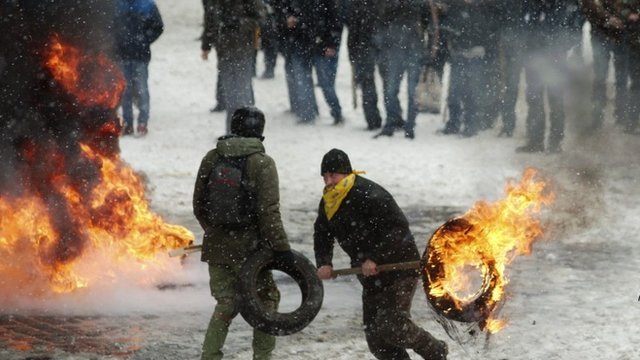
Opposition leaders in Ukraine have issued an ultimatum to President Viktor Yanukovych, after talks failed to resolve the political stalemate
Wednesday’s unrest came on the day that new anti-protest laws entered into force. Parliament approved the laws last week, triggering renewed protests which spilled into violence on Sunday night.
As dawn broke on Thursday, the barricades were still burning, billowing black smoke from the piles of tyres that now mark the front line between the riot police and the protestors.
Speaking at a mass rally on Wednesday evening, Vitali Klitschko said the president could end the stand-off “without bloodshed” by calling early elections, but that “tomorrow, if the president does not respond… then we will go on the attack”, to roars of approval from the crowd.
Vitali Klitschko said police were preparing to clear demonstrators out of the main protest encampment at Maidan (Independence Square).
“We must do all we can to stop them clearing us out,” he told demonstrators.
Another opposition leader, Arseniy Yatseniuk, said the government had 24 hours to respond to the demands, which also include the lifting of the new anti-protest laws.
“If this does not happen, we will march forward together. If it’s a bullet to the head, then it’s a bullet to the head,” he declared.
But the prime minister said opposition leaders should be “more humble”.
“The opposition leaders should move away from the language of ultimatums,” Mykola Azarov said.
“We are ready to compromise, to agree. The opposition leaders should understand that they also bear responsibility in avoiding a civil war, and bloodshed, and so does the government.”
Wednesday’s violence began in a small area around Hrushevskyy Street, a road leading to government buildings close to the protest camp at Maidan.
Security forces later fell back to their positions after fierce clashes with protesters, but by the afternoon had pushed on through the barricades.
Protesters again hurled petrol bombs and stones while riot police responded with stun grenades and rubber bullets.
Thousands of protesters also gathered in Independence Square.
There was a crush at one of the narrow entrances into the square when protesters trying to get in met protesters who were trying to get out to fight the police.
At least two ambulances were seen carrying away the wounded.
Officials confirmed two bodies were found with bullet wounds close to the scene of the clashes.
[youtube 4EH4KRGzhhQ 650]
Two people have died in clashes between police and protesters in Kiev, Ukraine.
Prosecutors confirmed the two had died from bullet wounds. They are the first fatalities since protests began in November at the government’s rejection of a planned treaty with the EU.
Wednesday’s clashes began after police moved in to dismantle a protest camp.
Ukrainian President Viktor Yanukovych is reportedly meeting with opposition leaders later to discuss the crisis.
The clashes come on the day that new anti-protest laws come into force. Parliament approved the laws last week, triggering renewed protests, which spilled into violence on Sunday night.
Hundreds of people have been injured, though some of the violence has been blamed on a little-known far-right group, Right Sector.
Meanwhile, the US embassy in Ukraine says it has revoked the visas of “several Ukrainians who were linked to the violence”. It did not give names, but said it was “considering further action against those responsible for the current violence.”
Wednesday’s violence began in a small area around Hrushevskyy Street, a road leading to government buildings and also close to the main protest encampment at Maidan (Independence Square).

Prosecutors confirmed two people had died from bullet wounds in Kiev clashes
Shortly after 08:00 a.m. – after a relatively peaceful night – police stormed the protesters’ barricades on Hrushevskyy Street.
The police later fell back to their positions after fierce clashes with protesters, but by the afternoon had pushed on through the barricades.
Protesters again hurled petrol bombs and stones while riot police responded with stun grenades and rubber bullets.
Meanwhile thousands of protesters have gathered in Independence Square.
There was a crush at one of the narrow entrances into the square when protesters trying to get in met protesters who were trying to get out to fight the police, our correspondent says.
At least two ambulances were seen carrying away the wounded.
Black smoke caused by the burning of tyres is now billowing over Kiev, while footage shows armoured vehicles moving into the area.
Officials confirmed the deaths of two people, found with gunshot wounds earlier on Wednesday. The general prosecutor said their bodies were found in a national library close to the scene of the clashes.
Medics for the activists say at least one person had multiple wounds and claimed he had been killed by a police sniper.
A third activist is also reported to have died on Wednesday from injuries sustained after falling from the top of the Dynamo football stadium.
PM Mykola Azarov denied the police would have been responsible for the deaths as they were not carrying live ammunition.
They “remain on the consciousness and responsibility of the organizers and certain participants of mass disturbances,” he said.
Many of the protesters have been wearing helmets and face masks in defiance of the new laws that ban the wearing of such headgear at protests. The laws also prescribe jail terms for anyone blockading public buildings and outlaw unauthorized tents in public areas.
[youtube LLV6-o-GetU 650]
Kiev clashes are continuing between police and anti-government protesters, prompting Ukrainian President Viktor Yanukovych to warn that the violence is a threat to the whole country.
A burnt-out line of buses and trucks in central Kiev marks the boundary between protesters and police.
Clashes erupted on Sunday, after many more demonstrators rallied peacefully against President Viktor Yanukovych.
The authorities say police have the right to use firearms in self-defense.
In a statement on Monday evening, President Viktor Yanukovych said that “now, when peaceful actions are turning into mass unrest, accompanied by riots and arson attacks, the use of violence, I am convinced that such phenomena are a threat not only to Kiev but to the whole of Ukraine”.
Last week the president’s supporters in the Ukrainian parliament gave police extra powers to tackle demonstrators.
At least 20 people have been arrested in the clashes, and about 100 injured, including dozens of police officers.
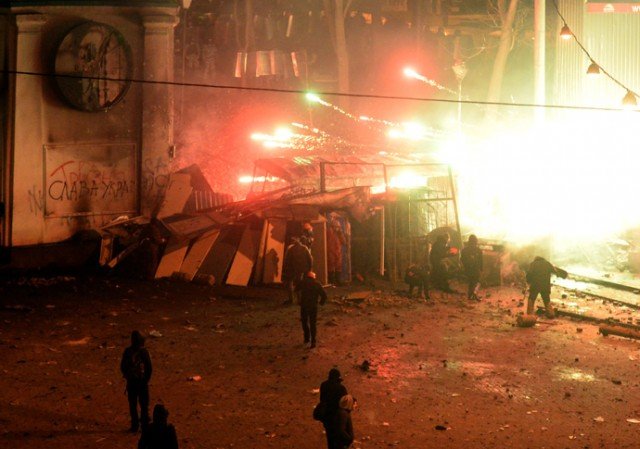
Kiev clashes are continuing between police and anti-government protesters
The violence followed weeks of mainly peaceful action against Kiev’s decision to spurn a political agreement with the EU, and then to toughen anti-protest laws.
Viktor Yanukovych says he is now ready to negotiate with pro-EU protesters and opposition leaders.
A cross-party commission was being set up on Monday to try to resolve the deepening crisis.
Former Interior Minister Yuriy Lutsenko, who was injured in clashes earlier this month, is among four representatives of the opposition who will be taking part in the talks with the authorities, according to the website for Ukraine’s Fatherland Party.
On the road leading from Europe Square to parliament, riot police were still standing behind shields on Monday, lined up against dozens of protesters who had camped out overnight despite temperatures dropping well below freezing.
The police are firing plastic bullets, tear gas canisters and stun grenades, and even throwing back the cobblestones, he reports.
EU foreign ministers also released a statement on Monday expressing “deep concern” about the new legislation, which they said was passed under “doubtful procedural circumstances”.
“These legislative acts would significantly restrict the Ukrainian citizens’ fundamental rights of association, media and the press, and seriously curtail the activities of civil society organizations,” they said, following a monthly meeting.
[youtube 3la1EeXJ4_M 650]
Ukrainian President Viktor Yanukovych has agreed to talk with pro-EU protesters and opposition leaders after violent clashes in Kiev.
Viktor Yanukovych said a cross-party commission would be set up on Monday to try to resolve the deepening crisis. Opposition leaders confirmed this.
Earlier, a group of protesters – trying to reach parliament – clashed with police. Dozens of people were injured.
The US and EU called for an end to the violence and urgent political talks.
The violence broke out as many thousands of protesters held a rally in Kiev’s Independence Square, outraged by new laws which they said restricted basic freedoms.
The ruling party of Viktor Yanukovych denies this, saying the legislature is in line with European standards.
However, Western countries have expressed deep concern at the new laws.
The anti-government movement began in protest at Viktor Yanukovych’s decision in late November to pull out of a landmark treaty with the EU, but has expanded to demand his resignation.

President Viktor Yanukovych has agreed to talk with pro-EU protesters and opposition leaders after violent clashes in Kiev
Late on Sunday, President Viktor Yanukovych’s press office said a “working group” headed by National Security and Defense Secretary Andriy Kluyev would be set up.
It said the group – made of members of government and the presidential administration – would meet opposition representatives on Monday to try to resolve the crisis.
Opposition leader Vitali Klitschko confirmed this after meeting President Viktor Yanukovych at his residence outside Kiev.
“We must use every opportunity to resolve the crisis peacefully,” the former world heavyweight boxing champion, who leads the Udar party, told Ukraine’s Hromadske TV.
He warned against a “scenario of force”, adding that he “didn’t rule out the possibility of a civil war”.
Arseniy Yatseniuk, another opposition leader, said Viktor Yanukovych personally called him to say that he was ready for talks.
However, the opposition warned that the talks must produce real results and not be an opportunity for the president to play for time. The opposition is demanding the resignation of the government and snap presidential elections.
But opposition leaders are under huge pressure to come up with an action plan, amid criticism from many activists that their campaign has been too passive.
[youtube wALnTLzUWn0 650]
Large crowds of pro-EU demonstrators rallying against new laws which aim to curb public protests in Ukraine have clashed with police in Kiev.
Stun grenades and flares were thrown as groups of people headed for parliament, which was cordoned off by rows of police and buses.
Opposition politician Vitali Klitschko tried to stop attacks on police.
The laws were passed with a quick show of hands on Thursday by MPs loyal to President Viktor Yanukovych.
The opposition accused the ruling party of a coup.
US and EU officials have expressed deep concern at the new legislation.
Ukraine’s current anti-government movement began in protest at Viktor Yanukovych’s decision in late November to pull out of a landmark treaty with the EU, but has expanded to demand his resignation.
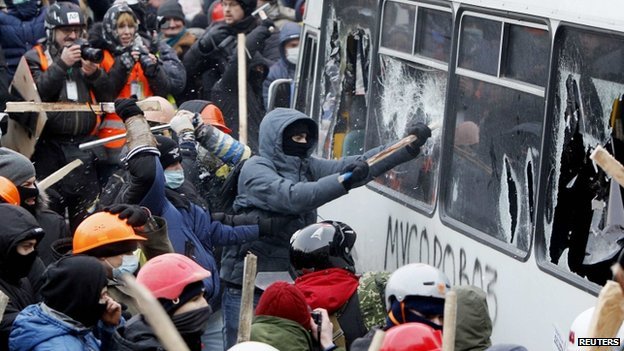
Large crowds of pro-EU demonstrators rallying against new laws which aim to curb public protests in Ukraine have clashed with police in Kiev
Sunday’s rally in Kiev, attended by tens of thousands, heard calls from opposition politicians to disregard the new laws curbing protests that pro-EU demonstrators have been staging for the past two months.
Clashes erupted as some people headed away from the main square towards parliament, encountering cordons set up by police. Live TV pictures showed them attempting to overturn a bus used by police. The bus was set on fire after petrol bombs were thrown.
Interior Ministry spokesman Serhiy Burlakov blamed “provocateurs and extremists” for the confrontations and urged people not to follow their lead.
Police were filming everything and had opened criminal proceedings under Article 294 (organization of mass riots), the Interior Ministry said.
Earlier the rally on the main square heard a call from a former Ukrainian navy chief for members of the armed forces to defy “illegal” orders from those in power, Unian news agency reported.
Rear Adm Ihor Tenyukh, who was sacked by President Yanukovych in 2010, warned of the dangers posed by the “coup d’etat planned by the current authorities”.
“Tomorrow the regime will enslave you too. Therefore we are calling on you to fulfill your military oath of loyalty to the Ukrainian people and not to the authorities who have gone off the rails,” he was quoted as saying.
Opposition leaders are under huge pressure to come up with an action plan, amid criticism from many activists that their campaign has been too passive.
The new curbs on protests, which have been signed into law by the president, include:
- A ban on the unauthorized installation of tents, stages or amplifiers in public places
- Provision to arrest protesters wearing masks or helmets
- A ban on protests involving more than five vehicles in convoy
- Hefty fines or jail for breaches of law
The protesters have been camping out behind extensive barricades on the Euromaidan, as Independence Square has been dubbed, for nearly two months.
[youtube TnLsCahixKk 650]
Thousands of Ukrainians have rallied in Kiev in the first anti-government protest of 2014.
Ex-heavyweight boxing champion Vitali Klitschko encouraged the crowd to continue occupying Kiev’s Independence Square.
The protesters oppose President Viktor Yanukovych’s policy of strengthening ties with Russia rather than the EU.
They began a series of rallies in November calling for his resignation.
The protests, and occupation of the square by activists, were sparked by Viktor Yanukovych’s decision to abandon plans to sign an association agreement with the EU.
Instead, Ukraine struck a deal with Russia in December, which has seen big cuts in the price of gas imports from Russia.
Moscow also supported Ukraine’s finances with a $15 billion purchase of government bonds.
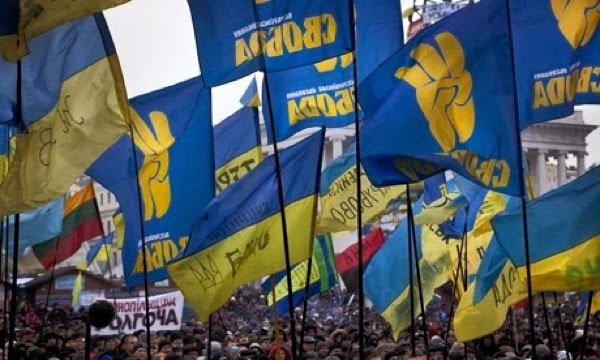
Thousands of Ukrainians have rallied in Kiev in the first anti-government protest of 2014
Some 10,000 people are estimated to have gathered for this latest rally – considerably fewer than the peak of the campaign in December which saw crowds estimated at 200,000.
Many protesters have stayed camped out in Independence Square since the opposition campaign began.
There have been occasional outbreaks of violence as police tried unsuccessfully to clear the square using tear gas.
“The authorities are pretending they cannot hear us. I know it’s hard for us, but we have enough strength to win,” Vitali Klitschko told the crowd.
He called for renewed demonstrations after the Orthodox Christmas holidays on Monday and Tuesday and warned of a general strike.
The last major opposition protest at the end of December was given further impetus by an attack on activist and journalist Tetyana Chornovol, who was severely beaten up on Christmas Day.
She had accused Viktor Yanukovych of corruption over his financing of his official residence outside Kiev.
Viktor Yanukovych denied any allegation of corruption and called for an investigation into the attack on Tetyana Chornovol.
[youtube K63nX0F6zjI 650]
Fresh anti-government protests gathered tens of thousands of Ukrainians in Kiev.
Many demonstrators also marched on President Viktor Yanukovych’s official residence outside the capital.
They have been re-energized by a brutal attack on a prominent journalist, Tetyana Chornovol, on Christmas Day.
Tetyana Chornovol had accused Viktor Yanukovych of corruption over his financing of the Mezhygirya residence in an expose.
Viktor Yanukovych denies any allegation of corruption and has called for an investigation into the attack on Tetyana Chornovol.
Protesters made their way to the Mezhygirya residence, some 9 miles away on the banks of the Dnipro river, by bike, car and minibus, where they carried a coffin to symbolize what they hope is the end of his political life, AFP reported.
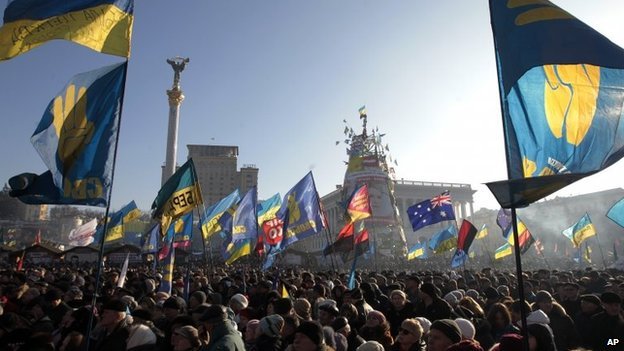
Ukrainian protesters have been re-energized by a brutal attack on journalist Tetyana Chornovol on Christmas Day
Demonstrators first took to the streets in late November, angered by President Viktor Yanukovych’s decision to abandon an association agreement with the European Union in favor of closer ties with Russia.
Protesters continue to occupy the central Independence Square and have refortified barricades to ward off attempts by police to clear the camp – though such attempts now appear to have been abandoned.
But on Sunday, more protesters returned to the streets of Kiev, many angered by the attack on Tetyana Chornovol, who says her car was run off the road before she was taken out and beaten by men.
Pictures have been circulated of her bloodied and swollen face following the beating.
Local news agencies say five men have been placed under arrest but no motive has been put forward.
Tetyana Chornovol, 34, says her assailants followed her in a “black luxury” SUV after she had been taking pictures of the residences of senior administration figures.
[youtube bD0Pqnyd_ZQ 650]
Ukraine’s President Viktor Yanukovych has said he strongly opposes Western politicians intervening in the crisis in his country.
Asked about their recent visits to the protest camp in Kiev, Viktor Yanukovych said: “I am categorically against anybody coming and teaching us how to live.”
The opposition is furious after Viktor Yanukovych accepted a Russian bailout, seen as a reward for rejecting EU integration.
President Vladimir Putin said he was defending the Russian economy.
“We just want to defend our gates,” Vladimir Putin told journalists in Moscow, days after Russia gave Ukraine a $15 billion (10.9 billion euros) bailout and gas discount.
Ukraine, Vladimir Putin said, was a fraternal state with close industrial ties to Russia.
Protests have gripped much of Ukraine since President Viktor Yanukovych suspended the EU deal last month.
The opposition has been demanding to know what, if any, conditions the Kremlin attached to its decision to buy $15 billion in Ukrainian government bonds and slash the gas price from more than $400 per 1,000 cubic metres to $268.5.
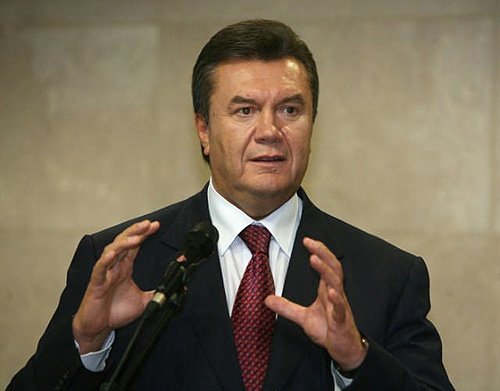
Viktor Yanukovych has said he strongly opposes Western politicians intervening in the crisis in Ukraine
Russia’s financial help averted a debt crisis for Ukraine in the short term.
At a news conference in Kiev on Thursday, Viktor Yanukovych was asked about visits to the pro-EU protest camp by foreign politicians who have included US Republican Senator John McCain, EU foreign policy chief Catherine Ashton, former German Foreign Minister Guido Westerwelle and others.
“What is very important is that this is our internal matter, and that other countries do not intervene in our internal affairs,” he said.
He said the deal with Moscow did not run counter to Ukraine’s course towards European integration and blamed Ukraine’s current economic problems on the policies of his predecessors, the leaders of Ukraine’s pro-Western Orange Revolution.
Asked why the Ukrainian economy was in such trouble, Viktor Yanukovych said the gas contract signed with Russia by former PM Yulia Tymoshenko in 2009 had incurred a loss of $20 billion.
Another problem, he said, was the repayment of an IMF loan of $16.4 billion negotiated in 2008, and a third factor was the recent fall in trade with Russia and other ex-Soviet states.
Asked about his position on the Customs Union led by Russia, Viktor Yanukovych said that Ukraine only had observer status but he suggested that it could adopt certain clauses.
“Ukraine’s government is studying these clauses and, once conclusions are drawn, the corresponding transparent decisions will be taken on which clauses we will adhere to,” he said.
Ukraine’s pro-EU protesters have rejected any move to join the Customs Union, which was set up in 2010 and includes Russia, Belarus and Kazakhstan.
Ukraine’s PM Mykola Azarov has told ministers in Kiev that the decision to suspend a deal on closer EU ties and sign a Russian aid agreement instead has helped avoid bankruptcy.
The government’s surprise U-turn on an EU association agreement last month has sparked weeks of mass demonstrations.
But Mykola Azarov said the package from Russia would provide stability.
Russia has agreed to buy $15 billion (11 billion euros) of government bonds and slash the price of gas.
Ukraine’s opposition has demanded to know what Ukraine offered Russia in return.
Thousands of pro-EU protesters have been holding rallies in Kiev – occupying the capital’s Independence Square – and other cities in western and central Ukraine.
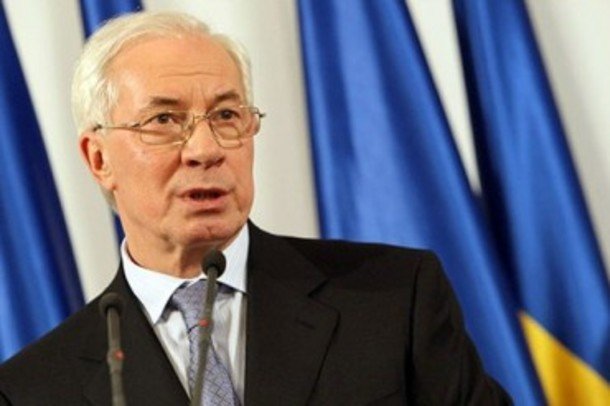
Ukraine’s PM Mykola Azarov said the decision to suspend a deal on closer EU ties and sign a Russian aid agreement instead has helped avoid bankruptcy
Critics say President Viktor Yanukovych has sold out to Russia and are calling for him and his government to step down.
But Ukraine’s prime minister defended the deal with Russia in a cabinet meeting on Wednesday.
“What would have awaited Ukraine? The answer is clear – bankruptcy and social collapse,” Mykola Azarov said.
“What a present for New Year that would be for the people of Ukraine.
“The agreements between the Ukrainian and Russian presidents allow us to plan the years to come as years of development and people’s confidence about their stable lives.”
He said a pact to lower gas prices by about a third would allow for “a revival of economic growth”.
There was no way Ukraine could have signed the EU agreement as Kiev would have had to accept unfeasibly stringent IMF conditions for economic reform, he added.
[youtube mucZKXSZaRc 650]
Ukrainian opposition leaders have demanded to know what President Viktor Yanukovych has offered Russia in return for a major economic lifeline.
Russian President Vladimir Putin has agreed to buy billions of dollars worth of Ukrainian government bonds and slash the price Ukraine pays for Russian gas.
The announcement comes as Russia tries to stop Ukraine moving towards the EU.
Opposition leader Vitali Klitschko told pro-EU protesters in Kiev Viktor Yanukovych was betraying Ukraine’s independence.
“He has given up Ukraine’s national interests, given up independence,” Vitali Klitschko, a former boxing champion, told the crowd on Tuesday.
“[President] Yanukovych used our country as collateral. According to our sources, he has agreed to a bailout from Russia and put Ukrainian plants, strategic industries, heavy industries, aviation and energy manufacturers up as collateral against it. We want to know what exactly he did put up as collateral, and his reasons for doing it.”
He called on President Viktor Yanukovych to hold a snap election.
“Yanukovych said at our round-table talks that he is not afraid of an early election. If that’s the case, let him prove it in an honest fight,” he said.

Ukrainian opposition leaders have demanded to know what President Viktor Yanukovych has offered Russia in return for a major economic lifeline
Although details of the agreement are unclear, Oleh Tyahnybok, leader of an opposition far-right group, said Viktor Yanukovych had “pawned whole sectors” of the country’s economy to Russia.
Ukraine urgently needs to cover an external funding gap of up to $17 billion (12.3 billion euros) next year to avoid defaulting on its debts.
After talks between Vladimir Putin and Viktor Yanukovych in the Kremlin, it was announced Russia would buy $15 billion-worth of Ukrainian government bonds.
The cost of Russian gas supplied to Ukraine has been slashed from more than $400 (291 euros) per 1,000 cubic metres to $268.5.
Vladimir Putin said the assistance was not “tied to any conditions”.
He also said they had not discussed Ukraine joining a Moscow-led customs union with Belarus and Kazakhstan.
The US has warned the Ukrainian government that the deal with Russia would not satisfy the protesters.
German Chancellor Angela Merkel said ties with Russia should not prevent Kiev from looking West.
“At the moment it seems to be an either-or proposition. We need to put an end to this,” Angela Merkel told ARD TV.
“A bidding competition won’t solve the problem.”
The current agreement signed between Russia’s Gazprom and Ukraine’s Naftogaz amends a controversial 2009 deal signed by former Ukrainian PM Yulia Tymoshenko, for which she was jailed two years ago.
[youtube IKzT8bFRgtA 650]
Russia has decided to cut the price of the gas supplied to Ukraine from more than $400 (291 euros) per 1,000 cubic metres to $268.5.
Russia also agreed at talks in the Kremlin to buy $15 billion worth of Ukrainian government bonds.
President Vladimir Putin and his Ukrainian counterpart Viktor Yanukovych did not talk about Ukraine joining a Russian-led customs union.
Protests continued in Kiev over the deepening ties with Russia.
Victor Yanukovych’s U-turn on an EU association agreement deal last month sparked mass demonstrations.
He admitted his decision had been influenced by heavy pressure from Russia.
The current protests, the largest since Ukraine’s 2004 Orange Revolution, are pushing for the resignation of Viktor Yanukovych and his government, and snap elections.
The gas agreement signed between Russia’s Gazprom and Ukraine’s Naftogaz amends a controversial 2009 deal signed by former Ukrainian PM Yulia Tymoshenko, for which she was jailed two years ago.
Ukraine relies on imports of Russian gas – and heavy energy-intensive industries in eastern Ukraine are especially anxious to keep the price of gas down. Some 75% of Ukraine’s engineering exports go to Russia.
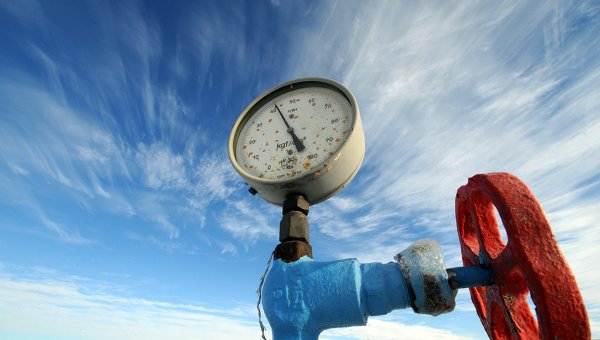
The cost of Russian gas supplied to Ukraine has been slashed by 33 percent
“Russia and Ukraine are… united both by many centuries of our friendship and by having lived a long time together in the same country,” Vladimir Putin said.
Trade between the two countries, he said, had dropped over the past two years, by 11% in 2012 and 14.5% this year.
“It is of course time to take vigorous action not only to return to the level of previous years, but also create conditions for moving forward,” he added.
Viktor Yanukovych said Ukraine would work with Russia and other ex-Soviet states to implement the free trade deal they signed two years ago.
“In the near future, we will not only have to co-ordinate this work between our countries, between Russia and Ukraine, but with other CIS [Commonwealth of Independent States] countries as well, so that our free trade area could finally start operating at its full capacity,” he said.
With talks on resuming credit from the International Monetary Fund stalled, Ukraine requires urgent financial assistance in the coming months to keep the economy afloat.
Kiev also needs to find about $17 billion next year to pay its outstanding gas bill to Russia.
Meanwhile, EU foreign ministers on Monday used a high-level meeting to reassure Russia that the association agreement with Ukraine would not undermine Moscow’s interests.
Supporters say closer ties with the EU could make the economy more open, transparent and prosperous, with greater competition and protection for investors.
But the EU partnership requires far-reaching and expensive reforms, which the government says would put at risk many enterprises reliant on trade with Russia.
Moscow has already put economic pressure on Ukraine, with customs delays and a ban on Ukrainian chocolates, and could escalate such measures.
Russia fears that such a deal would damage the country’s economy by letting in a massive flow of EU products via Ukraine.
Moscow wants Kiev to join the Customs Union instead of signing the EU pact.
[youtube 3waIM9Zu8tI 650]
Rival protests are expected in central Kiev, amid fears of possible clashes.
Activists and opposition parties are hoping hundreds of thousands of people will take part in a “Dignity Day” rally in the central Independence Square.
President Viktor Yanukovych’s supporters will gather in the nearby Mariinskyi Park.
Protests began last month after the president’s last-minute move to pull out of a landmark deal with the EU.
Viktor Yanukovych has said he fears the association and trade agreement will put at risk many enterprises dependent on trade with Russia.
The president – who says he eventually aims to sign the deal – has also admitted being under heavy pressure from Moscow, which wants Kiev to join a Russian-led customs union instead.
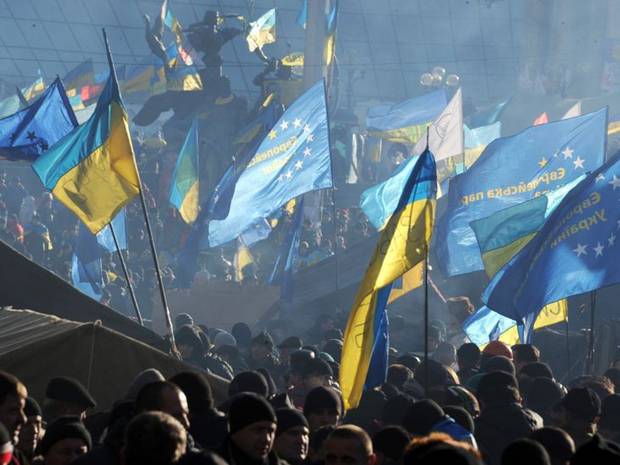
Rival protests are expected in central Kiev, amid fears of possible clashes
Several thousands pro-EU protesters remained overnight in Independence Square ahead of their rally, which is expected to start at 12:00 local time on Sunday.
Barricades around the perimeter of the main protest encampment in the heart of the capital have been strengthened following an attempt by special police to dismantle them earlier this week.
Opposition leaders have urged protesters to remain vigilant, fearing “provocateurs” could trigger clashes between rival demonstrators.
The opposition has also accused the authorities of bussing people into Kiev for the pro-government rally and providing them with money and food.
The authorities officially deny this, but a number of participants in the rally have said they were forced to take part.
The two rival camps held demonstrations close to each other on Saturday. There were no reports of any clashes.
President Viktor Yanukovych suspended his deputy security chief and Kiev’s mayor over the police violence against pro EU-protesters on November 30.
Prosecutors are investigating Volodymyr Syvkovych and Olexander Popov – alongside another two senior officials – on suspicion of abuse of office in the crackdown.
This has energized the pro-EU protesters, who are demanding that all those involved in the clampdown be sacked and punished. They also want the government to resign.
[youtube ripPQCCIdU0 650]
EU foreign policy chief Catherine Ashton has announced that Ukraine’s President Viktor Yanukovych intends to sign a deal on closer EU ties after all.
Baroness Catherine Ashton was speaking as pro-EU protesters continued to paralyze the centre of Kiev over Viktor Yanokovych’s decision not to sign the EU association agreement.
The president’s U-turn late last month followed pressure from Russia.
Catherine Ashton said Viktor Yanukovych had assured her when they met that his aim was to sign the agreement.
The baroness did not give an indication of when she expected this to happen.
She said his concern during their talks was the “short term economic issues” that Ukraine faced.
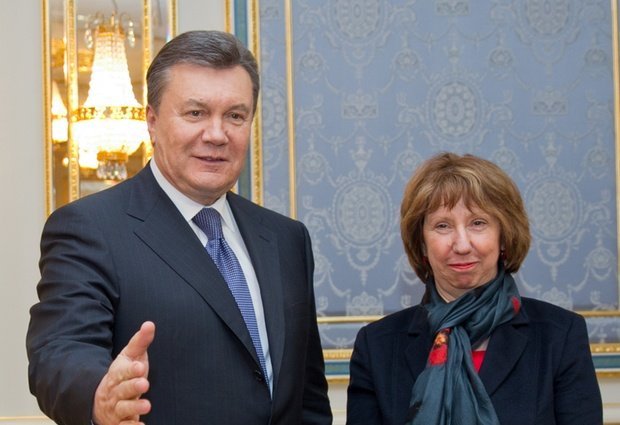
Catherine Ashton met President Viktor Yanukovych in Kiev
Viktor Yanukovych pulled out of the deal last month, explaining that Kiev could not afford to sacrifice trade with Russia. While adding that he still aimed to sign the deal, Viktor Yanukovych said Ukraine would need at least 20 billion euros ($27 billion) a year to upgrade its economy.
Catherine Ashton said on Thursday: “It is my view that those challenges, which are real, can be addressed by the support that not only comes from the European Union institutions, but actually by showing that he has a serious economic plan in signing the association agreement also will help to bring in the kind of investment that he needs.”
The Ukrainian government’s handling of the pro-EU protests in Independence Square in Kiev has met with a stern response from both the European Union and the US.
Police moved into the main protest camp in the early hours of Wednesday, prompting US Secretary of State John Kerry to express “disgust” at the government’s treatment of a peaceful protest.
At least nine people were detained and there were some reports of police using violence. The state department said later it was considering a range of responses including sanctions.
After her meeting with Viktor Yanukovych on Thursday, Catherine Ashton said she had insisted on the release of anyone arrested because of the protests and that the Ukrainian president had assured her that would happen.
Moscow is concerned the EU free trade deal with Kiev would flood the Russian market and wants Ukraine to sign up to a customs union that includes Belarus and Kazakhstan.
In his annual address to the Russian parliament on Thursday, President Vladimir Putin said he hoped a solution to Ukraine’s crisis could be found and insisted the customs union would not be forced on Kiev.
[youtube a38IzGgDI1g 650]
Riot police are taking up positions near Kiev’s City Hall, where thousands of Ukrainian anti-government protesters have massed.
More police are being bussed in with priests urging them not to use force.
The tense stand-off follows weeks of demonstrations after a government U-turn on a free trade deal with the EU.
President Viktor Yanukovych said a short while ago he would hold talks involving the opposition on Tuesday.
A statement on the president’s website said Viktor Yanukovych would hold talks with three of his predecessors on Tuesday to try to find a compromise.
The protesters have given Viktor Yanukovych 48 hours to dismiss the government and are demanding new elections for the presidency and government.
They have condemned Viktor Yanukovych for refusing to sign an association agreement with the EU last month. He said he shelved it because it would put trade with Russia at risk.

The protesters have given Viktor Yanukovych 48 hours to dismiss the government and are demanding new elections for the presidency and government
Protesters are blockading government buildings with cars, barricades and tents.
EU foreign policy chief Catherine Ashton will be in Ukraine on Tuesday and Wednesday “to support a way out of the political crisis”.
President of the European Commission, Jose Manuel Barroso, said in a statement that he had spoken to Viktor Yanukovych over the telephone and asked him “to show restraint”.
Jose Manuel Barroso said he had asked him “to not use force against the people that are demonstrating peacefully, to fully respect the freedoms that are so important for all of us in Europe”.
Hundreds of thousands of people took part in Sunday’s protest – the biggest so far in nearly three weeks of opposition demonstrations in Kiev.
During the evening, a group of protesters smashed the city’s statue of the Russian revolutionary leader Lenin, and brought its dismembered parts as trophies to Independence Square.
The statue stood at the top of Shevchenko Boulevard, and was toppled with metal bars and ropes, then smashed up with hammers. No arrests were reported in the incident.
These are the biggest street protests in Ukraine since the 2004 Orange Revolution, which swept pro-Western leaders to power, though Viktor Yanukovych made a comeback in 2010.
Many of the protesters suspect Russia’s President Vladimir Putin of trying to model a new Russian-led customs union on the Soviet Union. So far only Belarus and Kazakhstan have joined it.
The opposition party of jailed former PM Yulia Tymoshenko has urged people to “chase” the president “until he falls”.
Meanwhile the Ukrainian Security Service said it was investigating some politicians on suspicion of what it called “actions aimed at seizing state power”.
[youtube yvQMBq9v81Q 650]
Hundreds of thousands of pro-EU demonstrators have taken to the streets of Kiev seeking the Ukrainian government’s resignation.
Protesters, who oppose a customs union with Russia, toppled a statue of Lenin and smashed it with hammers.
President Viktor Yanukovych has said he shelved the EU deal after Russian opposition.
Protest leaders have given him 48 hours to dismiss the government.
As darkness fell, protesters were blockading key government buildings with cars, barricades and tents.
Witnesses said a group of protesters toppled the statue of Soviet leader Lenin at the top of Shevchenko’s Boulevard using metal bars and ropes and then began smashing it up with hammers.
Others stood by chanting “glory to Ukraine”.
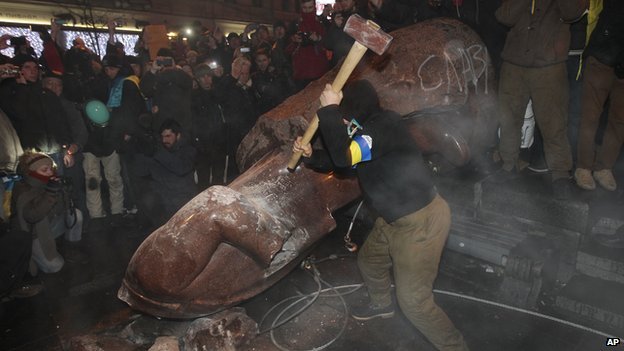
A group of protesters toppled the statue of Soviet leader Lenin at the top of Shevchenko’s Boulevard
Correspondents say the statue has symbolic importance as it underlines Ukraine’s shared history with Russia.
In another development on Sunday, the Ukrainian Security Service said it was investigating some politicians on suspicion of what it called “actions aimed at seizing state power”.
It did not name the politicians.
Amid rising tensions, the European Commission said EU foreign policy chief Catherine Ashton would travel to Ukraine this week “to support a way out of the political crisis”.
Waving EU and Ukrainian flags, protesters on Sunday congregated on Kiev’s Independence Square – the scene of previous clashes with police.
Ukraine’s special police force, Berkut, has been widely condemned for beating protesters in the square – known as Maidan.
The opposition party of jailed former PM Yulia Tymoshenko has urged people to “chase” the president “until he falls”.
“We are on a razor’s edge between a final plunge into cruel dictatorship and a return home to the European community,” Yulia Tymoshenko said in a message to the crowd read out by her daughter.
“Don’t give in, not a step back, don’t give up, the future of Ukraine is in your hands,” the message read.
The protests are the largest since the pro-democracy Orange Revolution in 2004.
A smaller pro-government rally was held close to the opposition march with police separating the two.
[youtube JAhfS9R1Kvg 650]
Differences between Russia and Ukraine on reducing the price of Russian gas have been narrowed after talks in the Black Sea resort of Sochi, Russian officials announced.
President Vladimir Putin’s spokesman Dmitriy Peskov said the talks would continue at a later date.
Ukraine’s President Viktor Yanukovych and his Russian counterpart Vladimir Putin had been expected to debate Kiev joining a Moscow-led customs union.
But Dmitry Peskov said the issue was not discussed.
Last month Viktor Yanukovych shelved a partnership deal with the EU, triggering angry protests in Ukraine’s capital Kiev.
Russia was unhappy with the deal and Vladimir Putin has been urging Ukraine to join a Russian customs union with Belarus and Kazakhstan.
The two neighbors have also been trying to resolve a long-running dispute over energy supplies.

Ukraine’s President Viktor Yanukovych and his Russian counterpart Vladimir Putin
Ukraine depends on imports of Russian gas, but the supplier, Gazprom, has recently complained that Kiev had fallen behind in payments.
Disputes over supplies to Ukraine before 2009 saw Gazprom temporarily cutting off supplies.
Pipelines passing through Ukraine also pump Russian gas to many EU member states.
Dmitriy Peskov told Interfax news agency that “great attention has been devoted to the co-operation in the energy sphere”.
“Both sides narrowed the gap between their positions as a result of the discussion. However, no final agreement has been reached.”
He added: “The issue of Ukraine joining the customs union was not discussed during the meeting in Sochi.”
Ukraine has so far not commented on the talks.
Correspondents had earlier speculated that an agreement on Ukraine joining the customs union might be reached in return for reduced energy prices.
Many Ukrainians were furious that Viktor Yanukovych refused to sign the association agreement with the EU, which had followed years of negotiations.
On Saturday, nearly 1,000 supporters of the EU deal braved snow and swirling winds as they maintained control of Kiev’s Independence Square for the seventh successive day.
[youtube kwSWPqR2ybU 650]
Ukrainian activists are blockading the government buildings in Kiev, as they prepare for fresh demonstrations demanding the resignation of the government.
Hundreds of protesters spent the night in Independence Square while others were barricaded inside city hall.
The unrest was triggered in November by President Viktor Yanukovych’s refusal to sign a deal on closer EU ties.
Parliamentary speaker Vlodymyr Rybak said talks between the government and the opposition would be held on Monday.
Vlodymyr Rybak said all sides would have an opportunity to express their opinions.
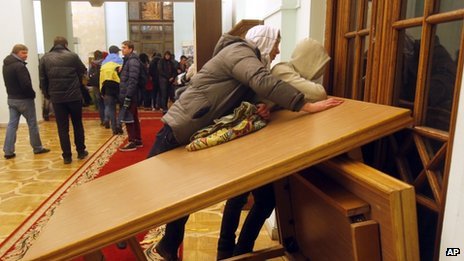
Ukrainian activists are blockading the government buildings in Kiev
About 1,000 protesters camped out on Independence Square overnight, as activists prepare for round-the-clock demonstrations.
The protesters are blocking off the government’s main headquarters. Opposition leaders have called for a national strike and fresh street protests.
On Sunday between 100,000 and 500,000 took part in a march, defying a ban on rallies.
There were clashes near the presidential building, with demonstrators firing flares and riot police using tear gas, batons and stun grenades.
Some protesters stormed the city hall. One of them is the Russian opposition activist Pyotr Verzilov – husband of Pussy Riot punk group member Nadezhda Tolokonnikova, who is in jail in Russia.
Protests started more than a week ago after Viktor Yanukovych suspended preparations for signing an EU association agreement that would have opened borders to goods and set the stage for an easing of travel restrictions.
[youtube G4uJOi5Mk_Y 650]
New mass protests against Ukrainian President Viktor Yanukovich’s refusal to sign a trade deal with the EU are planned for Sunday at noon.
They are demanding new elections, and the impeachment of the president.
Rallies continued through the night, with thousands gathered on the main square in the capital Kiev.
Police violently dispersed an opposition camp on Saturday, injuring dozens of people.
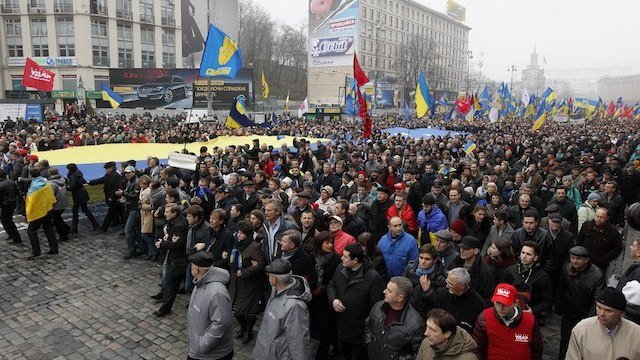
New mass protests against Ukrainian President Viktor Yanukovich’s refusal to sign a trade deal with the EU are planned for Sunday at noon
President Viktor Yanukovich said he was “outraged” by the police action.
The new rally is planned for Sunday at 12:00.
Jailed opposition leader and ex-PM Yulia Tymoshenko urged Ukrainians “not to leave the authorities’ actions unanswered”.
In a message read by her daughter on Saturday, Yulia Tymoshenko urged Ukrainians: “Fly, drive, walk to Kiev from all parts of Ukraine, but gather everyone on 1 December.”
“We can and should remove these authorities,” an opposition party leader Vitali Klitschko told thousands of demonstrators outside Kiev’s St Michael’s Golden-Domed Monastery.
“We should come out and show that we will not allow them to humiliate us, we will stand up for our rights.”
Vitali Klitschko said that supporters were travelling from the western city of Lviv and other Ukrainian cities to take part in Sunday’s rally.
Meanwhile, a court in Kiev has banned protested in Independence Square, European Square and at other locations in the city centre until January 7, 2014.
[youtube MhzetvS-1TE 650]
Speaking at the Eastern Partnership summit in Vilnius, European Commission President Jose Manuel Barroso has said the EU will not accept a “veto” by Russia on the bloc’s ties with former Soviet republics.
Jose Manuel Barroso said the era of “limited sovereignty was over in Europe”.
The summit failed to revive an association agreement with Ukraine that was due to be its centrepiece.
Ukraine’s President Viktor Yanukovych said he could not afford to sacrifice trade with Russia – which opposes the deal – for EU ties.
Viktor Yanukovych froze plans to sign Ukraine’s trade deal last week. In Vilnius, he defended his refusal to sign, saying the EU was not offering adequate financial aid.
After the two-day summit, Jose Manuel Barroso said: “We will not give in to external pressure, not the least from Russia.
“What we cannot accept is a condition on a bilateral agreement to have a kind of a possible veto of a third country. This is contrary to all principles of international law.”
EU Council President Herman Van Rompuy said the parties had been “really close” to signing the association agreement, but added that “we need to overcome pressure from abroad”.
“We are embarked on a long journey, helping Ukraine to become, as others, what we call now, <<new member states>>. But we have to set aside short-term political calculations.”
However, progress was made with two other ex-Soviet states, Georgia and Moldova.
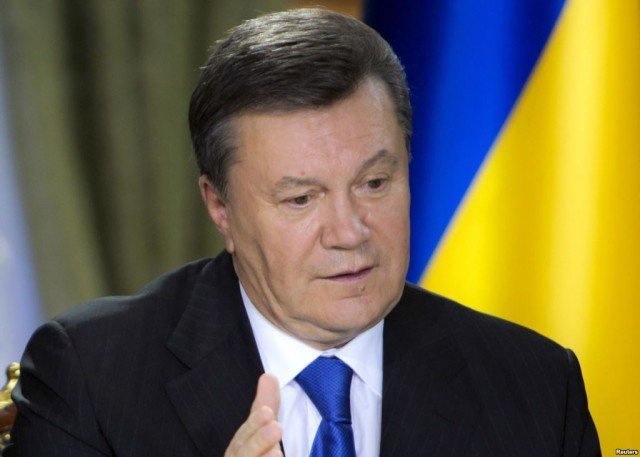
Viktor Yanukovych froze plans to sign Ukraine’s trade deal, saying the EU was not offering adequate financial aid
Association agreements with both were initialed – a stage prior to signing – on Friday. Diplomats have expressed hope those deals can be signed next year.
EU leaders said in a statement earlier that they “strongly” disapproved of Moscow’s pressure on Ukraine not to sign – while Russian President Vladimir Putin accused the EU of “blackmail”.
Analysts say Russia worked hard to undermine the EU agreement with Ukraine, which it sees as a strategically vital partner.
On the one hand, it offered Kiev loans and price discounts. On the other, it threatened painful trade sanctions and higher gas bills.
On Thursday, Viktor Yanukovych told Ukrainian TV that an EU offer to lend Kiev 610 million euros ($828 million) was inadequate.
He said Ukraine would need at least 20 billion euros a year to cover the costs of upgrading its economy to “European standards”.
“For three years in succession they [EU leaders] have shown this candy in pretty wrapping to us,” Viktor Yanukovych added.
“We don’t have to be humiliated like this. We are a serious country, a European one.”
Meanwhile pro-EU protests are continuing in Ukrainian cities against the government’s decision to back out of the agreement.
Prominent Ukrainian opposition politician Vitali Klitschko, who is also in Vilnius, said he hoped the agreement would be signed after all.
“We Ukrainians want the changes,” the world boxing champion added.
“We want to live with the European family, with European rules, with Europeans’ life standards.”
[youtube LbJUCUfzo7o 650]
EU leaders are gathering in Vilnius, Lithuania, for a summit rocked by Ukraine’s shock decision not to sign a far-reaching agreement.
The conclusion of the trade and reform deal was planned as the highlight of a summit aimed also at building ties with other East European states.
Ukraine’s President Viktor Yanukovych is likely to face tough questions from EU leaders on why he stopped the deal, apparently under Russian pressure.
Viktor Yanukovych has requested more EU financial aid.
Pro-EU protests are continuing in Ukrainian cities against the government’s decision to back out of the deal.
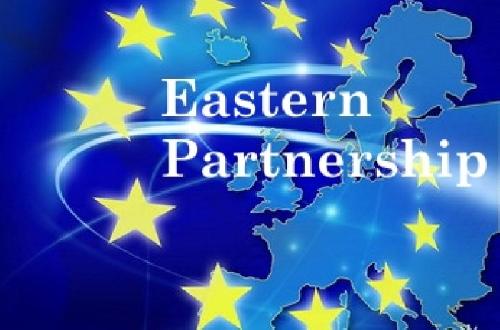
EU leaders are gathering in Vilnius for a summit rocked by Ukraine’s shock decision not to sign a far-reaching agreement
Viktor Yanukovych has dismissed an EU condition for signing the agreement – that Yulia Tymoshenko, the former prime minister and opposition leader, be freed from jail.
The dispute has increased tension between the EU and Russia, with Ukraine complaining it is becoming a “battleground” between the two.
EU leaders said in a statement that they “strongly disapprove” of Moscow’s pressure on Ukraine not to sign – while Russian President Vladimir Putin accused the EU of “blackmail”.
German Chancellor Angela Merkel, who is expected to have talks with Viktor Yanukovych on Friday, said Russia should not view relations between the 28-state bloc and ex-Soviet republics as a threat.
“We should overcome the ‘either us or them’ mentality,” Angela Merkel said.
“The Cold War is over.”
The two-day event, billed as the third Eastern Partnership Summit, is being held in the capital of Lithuania, which currently holds the rotating presidency of the EU.
The leaders are due to hold informal talks at a dinner on Thursday evening, with the official business of the summit to be conducted on Friday.
Initial political association agreements with Georgia and Moldova are due to be signed, as well as a visa agreement with Azerbaijan.
However, the centrepiece of the summit had been the association agreement with Ukraine. Such agreements, which promote democratic values and economic co-operation, are seen as a key step towards EU membership.
[youtube 2ILA0-0rUDc 650]
Russia had urged Ukraine to delay signing a trade deal with the EU, Ukrainian PM Mykola Azarov has admitted, as mass protest rallies continue across the country.
Mykola Azarov said Moscow had offered to hold trilateral talks on the issue, without giving “any ultimatums”.
Kiev last week put on hold the association and free trade deal with the EU, prompting Brussels to accuse Moscow of exerting pressure on Ukraine.
The move triggered huge pro-EU protests in Kiev and other Ukrainian cities.
Russian President Vladimir Putin has denied putting any pressure on Kiev, accusing instead the EU of “blackmailing” Ukraine into signing the agreement.
Speaking to reporters in Kiev on Tuesday, Mykola Azarov acknowledged that Russia had suggested “to delay signing the treaty and to conduct negotiations” between Kiev, Moscow and the EU.
He said Ukrainian President Viktor Yanukovych would still attend this week’s EU summit in Vilnius, Lithuania, to discuss the possible consultations with Brussels and Moscow.
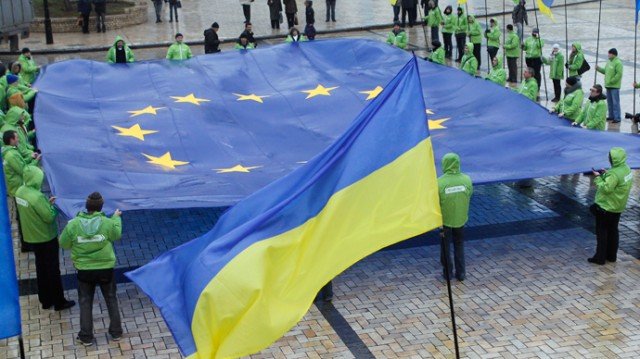
Russia had urged Ukraine to delay signing a trade deal with the EU
It had been originally planned that Ukraine would sign the treaty with the EU at the 28-29 November summit.
Mykola Azarov said such three-way talks would be in the best interests of Ukraine: “We absolutely do not want to be a battlefield between the EU and Russia. We want to have good relations with both the EU and Russia.”
He also added that separate “road-map” talks with Russia aimed at reviving economic ties would start next month and no agreement had been finalized on possible new financial support from the Kremlin.
Meanwhile, President Putin said it was solely up to Ukraine whether to sign or not the agreement with the EU.
During a visit to Italy, Vladimir Putin also urged EU leaders to refrain from “sharp words” on the issue.
Ukraine’s government said last Thursday it was halting preparations for signing the deal with the EU, amid concerns this would have a negative impact on Kiev’s trade relations with Russia and cause mass job losses as a result.
Moscow had earlier warned it would be forced to defend its market by raising custom duties on Ukrainian goods.
In a statement on Monday, Viktor Yanukovych said he had been forced to halt treaty preparations by economic necessity and the desire to protect those “most vulnerable”.
Tens of thousands of protesters have been taking to the streets of Ukraine’s major cities since last week.
[youtube e0N7FILsNm4 650]
A mass rally has taken place in Kiev following Ukraine’s decision to delay an association agreement with the European Union.
Opposition leaders including former world heavyweight boxing champion Vitali Klitschko have joined the protest on Independence Square.
Activists are comparing the rally to Ukraine’s 2004 Orange Revolution. They plan to make it a permanent rally.
Anti-riot police have been deployed.
A Kiev court has ruled that tents must not be erected on the square. In 2004 tents were a big feature of the protests against Viktor Yanukovych, the pro-Moscow presidential candidate whose election was marred by voting abuses. He is in power now and his arch-rival, Yulia Tymoshenko, is in jail.
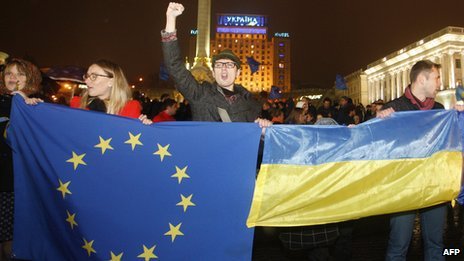
Activists are comparing the rally to Ukraine’s 2004 Orange Revolution
Ukraine came under intense pressure from Russia not to sign the historic EU deal at a summit next week.
Ukrainian activists are using social media to mobilise supporters, and on Thursday night opposition demonstrations also took place in the cities of Donetsk, Ivano-Frankovsk, Lutsk, Uzhgorod and Lviv.
Ukraine’s PM Mykola Azarov has said the decision not to sign a wide-ranging trade and association agreement with the EU next week was motivated solely by economics and was “tactical”. He said it did not alter Ukraine’s overall development strategy.
“The decision to suspend the EU association agreement signing is difficult, but the only one possible in the current economic situation in Ukraine,” Mykola Azarov told parliament.
The Ukrainian government said on Thursday that it was instead looking into setting up a joint commission to promote ties between Ukraine, Russia and the EU.
The Ukraine’s parliament vote, on which hangs the fate of both jailed opposition leader Yulia Tymoshenko and the country’s EU hopes, looks like it may not take place.
Attempts to agree a bill that would allow Yulia Tymoshenko to leave the country for medical treatment have stalled.
The EU has made the move a condition for it to sign an association and free trade deal with Ukraine this month.
But Ukraine has come under intense pressure from Russia not to sign.
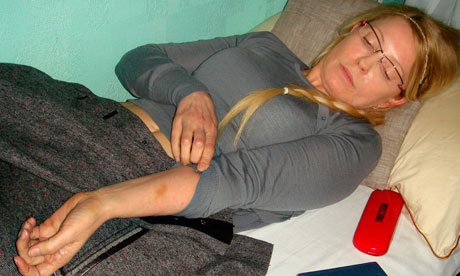
Attempts to agree a bill that would allow Yulia Tymoshenko to leave Ukraine for medical treatment have stalled
Russia wants Ukraine to join its own customs union with Kazakhstan and Belarus, which it sees as a prototype rival to the EU.
Ukraine’s President Viktor Yanukovych made a secretive visit to Moscow at the weekend.
MPs said on Wednesday that attempts between the government and opposition to finalize a bill allowing convicts to receive medical treatment abroad had failed.
The leader of the opposition Fatherland group, MP Arseniy Yatsenyuk, blamed Viktor Yanukovych’s ruling Party of the Regions for the failure, and said it was deliberately trying to destroy the EU deal.
“They are hindering Ukraine’s movement towards the European Union,” Arseniy Yatsenyuk said.
Former Prime Minister Yulia Tymoshenko is well enough to return to prison after spending nine months in hospital, the Ukrainian health ministry has said.
Yulia Tymoshenko was being treated for back problems after being jailed in 2011 for abuse of office.
Her supporters regard that conviction as politically motivated.
Last year Yulia Tymoshenko claimed to be too ill to attend court proceedings relating to a separate charge of misappropriation of public funds.
The Ukrainian authorities are also investigating allegations against her of tax evasion and involvement in murder.
Yulia Tymoshenko’s conviction for abuse of office relates to a gas deal she signed with Russia as prime minister in 2009, which critics said paid Russia too high a price.
Her supporters say the former prime minister was jailed to prevent her being a political threat to Viktor Yanukovych, the current president.

Ukraine’s former Prime Minister Yulia Tymoshenko is well enough to return to prison after spending nine months in hospital
Yulia Tymoshenko remains a popular politician despite her imprisonment, after coming second to Viktor Yanukovych in the 2010 presidential election.
She was a face of Ukraine’s pro-democracy Orange Revolution alongside Viktor Yanukovych’s long-time rival Viktor Yushchenko.
Correspondents say the health ministry’s announcement will make it difficult for Yulia Tymoshenko to avoid appearing in court.
Previously Yulia Tymoshenko has boycotted trial proceedings against her, and has also staged hunger strikes in protest at conditions in prison and alleged election fraud.
President Viktor Yanukovych’s party has claimed victory in Ukraine’s parliamentary election.
The Party of Regions has more than 36%, and the opposition party of Yulia Tymoshenko, who is in jail, has just over 21%, with one-third of party list votes counted.
It appears Viktor Yanukovych’s party is also ahead in single mandate districts, which form half of all the seats.
Western governments have condemned the jailing of Yulia Tymoshenko.
Yulia Tymoshenko leads a coalition of opposition groups – the United Opposition Fatherland bloc. She was given a seven-year jail sentence last year for abuse of power, and voted from her prison cell.
Her bloc says its own parallel vote count confirms that Viktor Yanukovych’s party is in the lead, but with a smaller percentage of votes than the party claims.
The complicated electoral system means a final result is some way off.
Thousands of observers were in Ukraine for the vote, whichViktor Yanukovych hopes will boost his democratic credentials.
His bitter rivalry with Yulia Tymoshenko dates back to the 2004 Orange Revolution, in which Tymoshenko and her allies established a pro-Western government, overturning Viktor Yanukovych’s victory in an election widely condemned as rigged.
Since his dramatic political comeback Viktor Yanukovych has forged closer relations with Moscow, Ukraine’s former master in the Soviet era.
The regional security organization OSCE is expected to give its verdict on Sunday’s election at a news conference at 14:30 local time.
Correspondents say the signs are that the Party of Regions will get a simple majority in the 450-member parliament.
Officials said the election had passed off smoothly, with a turnout of some 45%, about average for Ukraine.
Early results indicated the Communists – traditional allies of Viktor Yanukovych – were in third place with about 15%.
The new party of world heavyweight boxing champion Vitali Klitschko, called Udar (Punch), was on about 13%.
The ultra-nationalist Svoboda (Freedom) party was also poised to surpass the 5% threshold necessary to get seats in parliament. It was polling 8%, according to the early results.
Party of Regions MP Borys Kolesnikov, a deputy prime minister, said his party was likely to dominate the single-seat constituencies.
“There are 225 single-seat constituencies and we see our candidates winning two-thirds of them,” he said.
And Prime Minister Mykola Azarov said “we are expecting that the Party of Regions will take a majority in the new parliament”.
After casting his vote in the capital, Kiev, Vitali Klitschko said he was “going to parliament to fight”.
He listed his “five key punches” as corruption, indifference of the authorities, lack of local governance, inequality and poverty.
There were 3,500 accredited foreign observers, including more than 600 from the Organization for Security and Co-operation in Europe (OSCE).
Earlier, Western officials expressed concerns over campaigning.
In a New York Times editorial, US Secretary of State Hillary Clinton and EU foreign policy chief Catherine Ashton cited “worrying trends” in the interim election report from the OSCE (of which Ukraine is due to take over the rotating chair in January).
These included government resources being used to favor ruling-party candidates, media restrictions, vote-buying and lack of transparency on the electoral commissions.
Opposition supporters say Yulia Tymoshenko was prosecuted and imprisoned last year in order to prevent her running in the election.
The EU indefinitely postponed its association agreement, including a free trade pact, after the jailing.
Viktor Yanukovych, who has been president for three years and faces re-election in 2015, has rejected calls to free his rival. He says she was sentenced by an independent court.
Ukraine, with a population of 46 million, has been hit by the global economic downturn and unpopular pension and tax policies.
The Party of Regions recently attempted to assuage public opinion by boosting public-sector salaries and pensions.
But the reforms exacerbated a $2 billion budget deficit and called into question the likelihood of securing IMF lending, correspondents say.
[youtube faumDRkA56Q]
 Prev1...234Next
Prev1...234Next  Page 3 of 4
Page 3 of 4
























